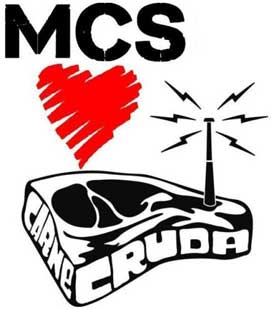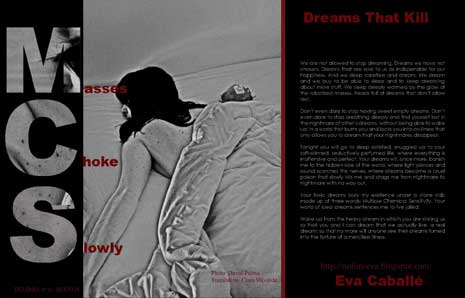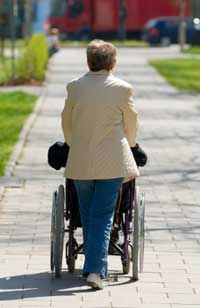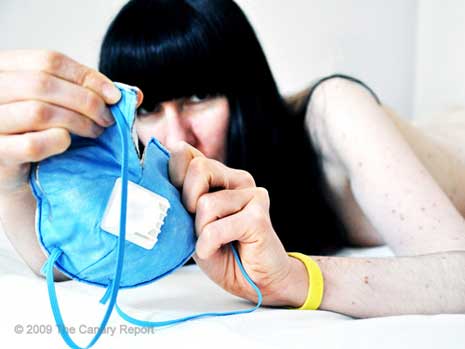
People from all over the world with chemical sensitivity have understood that their illness is a matter of policy, suppressed by certain lobbyist groups and industries so as to not lose their influence and revenues. For decades, these groups have succeeded in explaining chemically caused diseases as not existing and denouncing the afflicted as mental wackos through specific propaganda. Thanks to the internet, these structures are starting to crumble. The MCS-diseased network internationally, exchange expertise and encourage each other. The possibilities offered by social networks are multiplying this. Years ago barely none of the afflicted knew someone from another country, yet today this networking has turned the world into a “village”.
Never would I have gotten in touch with Eva, a young Spanish Lady who suffers from severe chemical sensitivity, extreme nutrition intolerances and CFS. Even if I had traveled to Barcelona where she lives, I would have never been able to meet her. For the past two years she only can stay in her home, and for several months she just lies in bed all day. In defiance of her severe illness, this remarkable activist manages to make the people of her country aware that our hyper consumption of chemicals in everyday products takes its toll. Together with Susie Collins from the U.S. Canary Report, I asked Eva to report on the last few months. This wish was important to both of us, because from Eva’s report other MCS-afflicted should take heart to become active.
Nobody expects that every sufferer of chemical sensitivity will achieve as much as that which can be read in the following report. It’s even not necessary, because there are many individuals throughout the world who have the same target – the acceptance of a disease which is not allowed to be, but which can’t be kept a secret any longer.
On the other hand, “never say never”, because you possibly may be somebody who still has good ideas and guts, even if you are only able to stay in bed and lack vigor. There sleeps more potential capacity in us as we reckon by ourselves. The intention of the following report is to inspire you:
Eva Caballé:
My friends Silvia Müller and Susie Collins asked me to write about all the Multiple Chemical Sensitivity awareness events I have done since June 2009. This is a summary of all my articles, collaborations and media appearances, which I hope have helped raise MCS awareness.
As many of you know, last June, I wrote an article called “The Naked Truth about MCS” for the on-line cultural magazine Delirio, with two photos of me naked wearing nothing but a mask. The article was translated into nine different languages, thanks to Susie Collins at The Canary Report and Silvia Müller at CSN – Chemical Sensitivity Network. Since then I have contributed to each edition of Delirio with articles focused on MCS: “Screaming from the Silence” and “Metamorphosis inside MCS”, and I am now working on the next one.
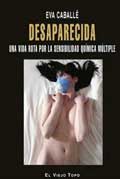 Then I decided to write a book to let people know, through my personal life and experience, what it’s like living with MCS: the total abandonment that we suffer and why people should be worried about all the toxic products they use daily. I finished writing Missing: A life broken by Multiple Chemical Sensitivity at the end of August, and in November the book was published by El Viejo Topo. The book was announced when Salvador López Arnal interviewed me to talk about MCS, an interview that was then translated into English, Japanese and German, thanks to my online friends.
Then I decided to write a book to let people know, through my personal life and experience, what it’s like living with MCS: the total abandonment that we suffer and why people should be worried about all the toxic products they use daily. I finished writing Missing: A life broken by Multiple Chemical Sensitivity at the end of August, and in November the book was published by El Viejo Topo. The book was announced when Salvador López Arnal interviewed me to talk about MCS, an interview that was then translated into English, Japanese and German, thanks to my online friends.
Thanks to “The Naked Truth about MCS,” I met a lot of interesting people from all around the world, and one of them in Japan, Takeshi Yasuma, from Citizens Against Chemicals Pollution (CACP), asked me to write a message to MCS patients and their supporters to be presented at the symposium in Celebration of the Recognition of MCS in Japan in October 2009. My message was read and displayed during the symposium.
In November, two weeks before my book was released, I was interviewed by phone at Radio 3 (National Radio in Spain), in a live culture program at prime time called Carne Cruda. For 25 minutes we talked about Multiple Chemical Sensitivity and my book, and they were so shocked that they promised me they would contact the Ministry of Health to explain to them the terrible situation of MCS sufferers. As many of you know, the Secretary General of the Ministry of Health was interviewed on air (my husband David talked to him on my behalf) and made a public commitment to meet MCS associations in Spain to listen to our claims. The meeting was held on February 4, 2010, the outcome of which was a commitment by the government to form a Scientific Committee to create a document of consensus on MCS.
At the end of November, an article about my blog No Fun was published in the youth supplement of the printed newspaper Deia. The article, entitled “Toxic Life,” was an extensive and accurate analysis of my blog (the information I provide, the translations I make, the articles I write, my collaborations, etc.), with focus on MCS and my collaborative work in the international fight for MCS awareness.
I also participated in the fabulous Canary Report 2010 wall calendar, with 14 other women from all around the world. The idea was inspired by my nude photos published at Delirio and I was very proud to be part of such an amazing project led by Susie Collins. The calendars are available for purchase and all profits are donated to the Environmental Working Group.
At the end of 2009, Salvador López Arnal interviewed me again, this time we talked more about my book and my experiences, and he also interviewed my husband David, who wrote the epilogue of my book. This interview was published in the printed magazine El Viejo Topo in January, and in February was released online.
During December 2009 and January 2010, three fabulous reviews of my book were published. The first one was published at Punts de Vista, a blog by Àngels Martínez i Castells, who is an economist and the president of Dempeus, a Catalan association in defence of public health. The second one was published at Kabila, a blog by Rafael G. Almazán, who is a journalist specializing in political and human rights. And the last one was published at the website of the environmental journalist and writer Miguel Jara.
At the end of January, another interview of me was published in the Health supplement of ABC, one of the most important printed newspapers in Spain. The interview, which was a double page and included a photograph of the cover of my book, was focused on MCS and my experiences explained in my book, but also focused on the total abandonment that people with MCS suffer. They included an MCS article written by Dr. Arnold, an immunologist specializing in MCS, which was also published at the website of the newspaper.
“El color de la tarde,” a magazine radio program on Radio Intercontinental, asked to interview me the day after the interview at ABC was published. I wasn’t able to do it because of my health condition, but they agreed to interview David on my behalf. The interview was focused on MCS and my book.
Also at the end of January, an article was published at El Observador magazine entitled “The canary of the mine.” This article, inspired by my book, was about MCS, toxics, my book, and Silent Spring by Rachel Carson. The article was written by an ecologist and it was very combative, encouraging lectors to become aware of the alarm from people with MCS. The article was finished with one paragraph of my book and the last sentence was: “Maybe so many toxic products have managed to turn us into sheep?”
In February, my book was mentioned in a literary radio program at Radio Euskadi and because of this, “La noche despierta,” another program of the same radio, asked to interview me by phone to talk about my book and MCS. My health didn’t allow me to make this interview but they agreed to interview David, my husband, because they were very shocked about my book. The interview with David at Radio Euskadi lasted 30 minutes and it was very deep and sensitive. They talked about MCS, how our government doesn’t do anything to help us and how are we doomed to live without support from social services. The journalist had an exquisite tact and the interview was moving. I answered one question that I previously recorded from bed.
In March, my book was added to the catalogue of two public libraries: Public Library of Navarra and Public library of University of Alicante. I am very excited about this because in both public libraries it’s the first book about MCS that they have.
Also in March, an interview with David was published at “La Contra,” a prestigious section of a very important printed newspaper in Spain: La Vanguardia. They wanted to interview me, but because of my health condition I couldn’t do it. The interview was about MCS and our experience and it was a great success. Because of it, another radio program has asked to interview David.
The same day of the interview at Radio 3, a Spanish filmmaker contacted me because he was shocked with the interview and he decided to make a short film to help to raise MCS awareness. He asked me to help him, because, even though the history would be fiction, he was very interested to make it as real and accurate as they can. The short film about MCS, entitled Los Pájaros de la Mina (The Birds of the Mine), has started to film in March and it’s raising much expectation, talk and press because it will be the first MCS short film in Spanish.
A national TV program called Terra Verda (Green Earth) asked me to participate in their program dedicated to toxics at home. Because of my health condition, they couldn’t come to my house but they agreed to have David record my interview with our video cam. They also asked us to show the changes we have done at home because of my MCS, and we did a second video showing all this information. This program will be aired at the end of March, and then I will post the program at my blog No Fun, along with the full-length version of both videos we recorded at home.
All this has happened in less than a year! I’m very excited about it because I could never imagine I would be able to do all this, especially when my health condition worsened. Of course I couldn’t ever do any of this without the help and support of David and all my family and friends from all around the world.
Author: Eva Caballé, No Fun, March 2010
Title Photo: Canary Report Calender 2010 – thanks to Susie for the permission

